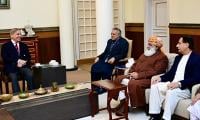Before Zia Mohyeddin, masterpieces of Urdu prose and poetry were only meant to be read or spoken. It was Mohyeddin who made Urdu literature something that also merited being heard.
Writer and musicologist Sharif Awan made this remark while speaking on Thursday night at a talk on the life and works of the legendary thespian and voice artiste at the National Academy of Performing Arts (Napa), which is holding a Zia Mohyeddin Festival to pay tribute to its founding head. The four-day festival will end tomorrow (Saturday).
Comparing Mohyeddin’s recitation of Urdu literature to Khayal singing by maestros, Awan said that as one was enthralled even after listening to a Khayal of the same raag for umpteenth time, one would discover new layers or shades of meaning after listening to Mohyeddin reciting the same literary text again. He specifically mentioned Asad Muhammad Khan’s short story ‘Basauday Ki Maryam’, which Zia had read out multiple times in his literary recitations, and whenever he recited it, the listener would grasp a new meaning in the text.
The speaker said Mohyeddin had a deep understanding of the Indian classical music and he had inherited that passion for music from his father Khadim Mohyeddin, who had written a two-volume book on the subject, ‘Raag Shiksha’.
Other speakers also echoed how music and rhythm were part of Mohyeddin’s soul.
His nephew Ateed Riaz recalled his childhood in 1950s when Mohyeddin brought a record of Lata Mangeshkar singing a song in Raag Hunsdhuni. He said Mohyeddin’s father had played an instrumental role in the development of the musical aesthetics of his son.
The speaker said that the legendary thespian had told him that one time he saw his father burst into tears was when a new principal of his college had termed music useless and banned music classes.
Riaz said there was no one in the subcontinent after Mohyeddin’s demise who could read out Shakespeare and Ghalib with the same perfection.
Poet Zehra Nigah, who was fortunate to have frequent interactions with Mohyeddin during her stay in London, said music made the bones of Mohyeddin.
She said Mohyeddin had immense respect for languages, and that was why he was very meticulous regarding grammar and pronunciation. He would never tolerate disrespect for the language, Zehra remarked.
She also remembered the late thespian as a thoroughly cultured man who would take action with the right etiquette.
Veteran actor Munawwar Saeed recalled his first association with Mohyeddin in early 1960s. He said he would perform in theatre plays penned by Khawaja Moinuddin.
Saeed remembered that due to financial constraints or other reasons, they did not have a proper set and there was a curtain behind the stage on which projectors would cast pictures in order to show the setting of the scene.
The veteran actor said it was Mohyeddin who for the first time used a proper set when he directed Moinuddin’s play ‘Lal Qalay Se Lalukhet Tak’. The speaker also mentioned the punctuality of Mohyeddin and stated that one of the reasons Mohyeddin did not act in many Pakistani films was lack of punctuality and discipline in the film industry.
Mohyeddin’s wife Azra mentioned how dedicated he was for Napa in his last years. She said he would never take leave even if he felt sick.
“How can you think that I will be absent at Napa?” he would say. She and her sister also shared anecdotes of what they said Mohyeddin’s wicked sense of humour.
The late artiste’s daughter Aliya recalled how she was directed by her father to play the role of ‘boy’ in “Waiting for Godot’. Mohyeddin’s son from an earlier marriage, Risha Mohyeddin, commented on how the late thespian guarded his emotions and was not very expressive.
He remembered his father as a “polyglot”, “stickler for order and organisation” and someone who was “driven to pursuit of perfection”.
Mohyeddin’s student at Napa who later became a faculty member at the same institute Fawad Khan stressed the need for continuing the legacy of Mohyeddin through quality teaching and production at Napa.
He expressed concern over the fact that Napa was facing financial issues and it was currently without no head of the music department as well as no permanent faculty member for acting. Actor Sania Saeed and journalist Peerzada Salman also showered praises on Mohyeddin at the event that was moderated by Napa alumnus Bakhtawar Mazhar.
A veiw of Mazaar-e-Quaid in Karachi. — APP/FileChoose Your WayThe Studio Seven Art Gallery is hosting an art...
Ambassador of Kazakhstan to Pakistan Yerzhan Kistafin in a meeting with Chief Executive TDAP Muhammad Zubair...
Sindh Culture and Tourism Syed Zulfiqar Ali Shah cuts a ribbon to inaugurate the Sheikh Ayaz Melo on December 20,...
This representational image shows a paralyzed person sitting in a wheelchair. — Pixbay/FileA distribution ceremony...
Representational image of workers of Majlis-e-Wahdat ul Muslimeen holding a protest on December 20, 2024. — INPThe...
Sindh Local Government Minister Saeed Ghani chairs a meeting on December 10, 2024. — Screengrab via...







